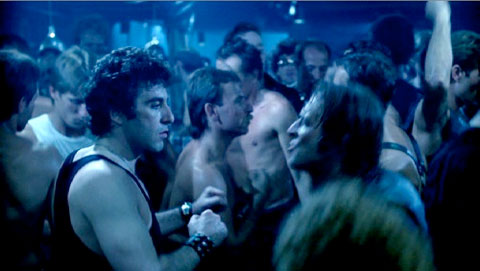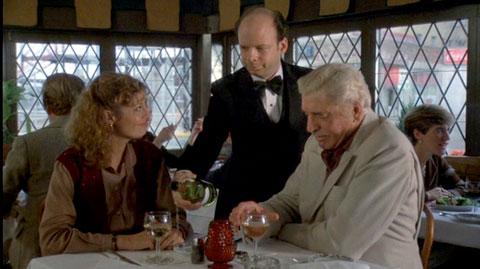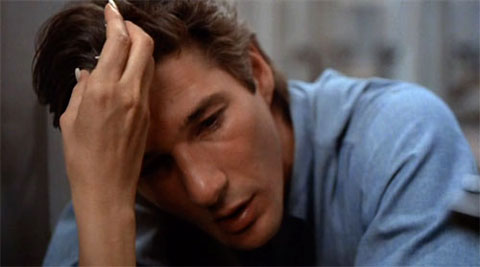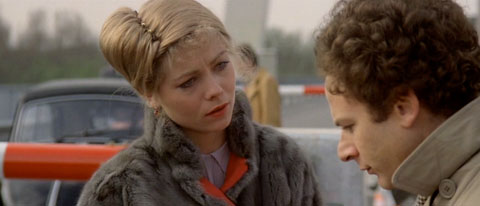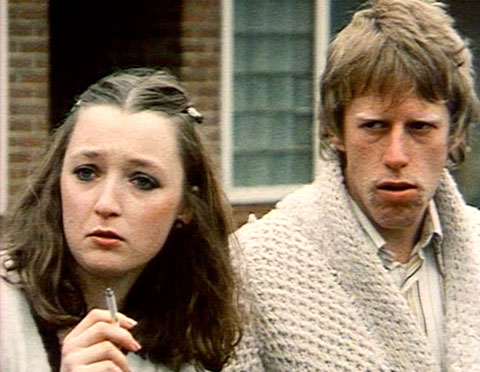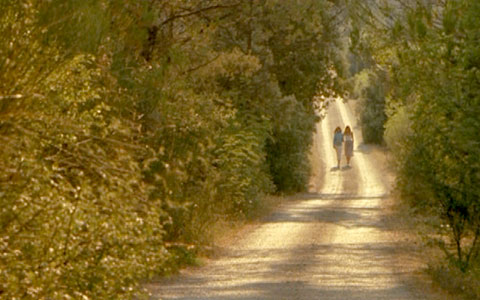Loulou (Maurice Pialat, 1980)
Nelly (Isabelle Huppert) leaves her controlling, bourgeois husband André (Guy Marchand) for Loulou (Gérard Depardieu), a petty criminal and top-notch lay, and all hell breaks loose. In my tweet about Loulou I described it as “the missing link (for me) between early New Wave & contemporary naturalism,” which, like so much of what goes on in the twitterverse, is pithy and imprecise. Like Jules and Jim and a number of films from Godard’s first phase — and also like so many of the classic genre films they’re riffing on — the love triangle here is a site of class conflict and shifting sexual and gender dynamics. Who’s the Whore here? Who’s the John? Pialat’s style allows plenty of room for the performers (is Huppert ever not amazing?) and ratchets up the cruelty and emotional suffering. My favorite scene takes place at a family reunion of sorts for Loulou and his kin, which plays like something from a Bruno Dumont film.
Cruising (William Friedkin, 1980)
Given Cruising‘s checkered reputation, I was disappointed to discover that it’s little more than an uninventive serial killer movie. That a film set in New York leather bars was financed and widely distributed in 1980 is fairly interesting in its own right (note to self: learn more about Lorimar, who also produced Being There the previous year), but the only aspect of Cruising that really piqued my curiosity was Al Pacino. I’m not refering to his performance, which is refreshingly low-key and out-of-balance, I guess. I’m talking about Pacino himself. He’s bulkier and more muscular in this role, which has the incongruous effect of making him seem smaller. That and his wardrobe made me consciously aware of his body for the first time. Cruising is structured as sensationalized tourism (“And on your right you’ll see that this breed of American Homosexual signals his fetishes with a brightly-colored bandana in his back pocket”), but its real transgression is its foregrounding of the gay male body, which, regrettably, remains a charged political act even now, three decades later. I guess it deserves some credit for that.
Atlantic City (Louis Malle, 1980)
My only memory of Atlantic City, which I saw one other time nearly twenty years ago, was, of course, the lemon scenes. I had no idea it was such a strange film. Populated with quirky, two-dimensional characters and structured around over-written and weirdly implausible plot turns, it’s closer in spirit to Sundance-approved American indie cinema of the last decade than the continental drama I was expecting. But, really, it’s impossible to not love Burt Lancaster here. Lou Pascal, the aging and never-too-important gangster he plays, is quietly dignified and kind, which makes him pitiful in the best sense of the word. The final shot of Lou and Grace walking off together after one last score is as sweet and joyful an image as you’re likely to find.
American Gigolo (Paul Schrader, 1980)
Another loose adaptation of Crime and Punishment, this time by way of Robert Bresson and Jerry Bruckheimer (there’s a pairing!), Paul Schrader’s third film as director is never less than watchable, thanks largely to Richard Gere’s performance, which is appropriately charismatic, pathetic, and vacuous. Schrader now admits he’s unsure whether the moral transformation Gere’s gigolo experiences in the final scene is authentic or “one that was simply imposed on him by his maker.” I share his ambivalence. That American Gigolo places a distant third in a race with Bresson’s Pickpocket and the Dardennes’ L’Enfant isn’t a surprise, but given their radically different modes of production, I find it hard to fault Schrader. It’s an interesting narrative experiment from a Hollywood release of 1980.
Bad Timing (Nicolas Roeg, 1980)
Amidst the formal fireworks on display here — the mesmerizingly elliptical cutting, the fast zooms, the unexpected music cues — what I found most shocking was Theresa Russell’s performance, which gives life to a role that, on paper, is little more than a misogynist fantasy. But, damn, she’s good. The image I captured above is from a scene on a bridge, where her reunion with Alex (Art Garfunkel) is spoiled by his pettiness, and her response is so natural and solicitous that, for a second or two, she breaks the movie. All of Roeg’s machinations are undone by the sudden intrusion of uncalculated emotion.
Grown Ups (Mike Leigh, 1980)
Made for BBC2 Playhouse, Grown Ups is about Dick (Philip Davis) and Mandy (Lesley Manville), a working-class Canterbury couple who are settling awkwardly into adulthood and their first home. Next door live one of their former teachers, Mr. Butcher (Sam Kelly), and his wife Christine (Lindsay Duncan), who, at first glance, seem the very models of middle-class civility. And that, of course, is the joke. Leigh has great fun contrasting the cold pedantry of Mr. Butcher with Dick and Mandy’s crass and loud-mouthed affection. The star of the film, though, is a nearly unrecognizable Brenda Blethyn, who plays Mandy’s older sister Gloria — a kind of spinstery, 30-something cross between Vickie Pollard and MadTV’s Lorraine. (Here’s a nice clip of Gloria in action. The entire film is available on YouTube.) Grown Ups reminds me that I need to spend more time with Mike Leigh.
Voyage en douce (Michel Deville, 1980)
Thanks to Dan Sallitt for making several mentions of Deville, the first great discovery of my little jaunt through the ’80s. I’m rarely caught off guard by a film these days, but Voyage en douce, a film I’d never heard of by a filmmaker I’d never heard of, offered one surprise after another. On paper, it sounds like late-night Cinemax fare: two women spend a weekend in the south of France, ostensibly in search of a vacation home, but devoting much of their time, instead, to remembrances of their sexual awakenings, casual flirtations, and, in the words of that old Monty Python sketch, “candid photography” (wink, wink, nudge, nudge). From the opening sequence, though, Deville establishes his authorship and makes obvious that titillation is not his chief concern. About À cause, à cause d’une femme (1963), one of Deville’s collaborations with Nina Companéez, Dan writes: “[They] are interested, not in the mechanics of their commonplace plots, but in an affectionate and profuse evocation of the feminine principle, and in giving a deadly serious account of romantic love. . . . To give full play to their concerns while remaining faithful to their narrative task, Deville and Companéez direct us to the important stuff largely through cinematic form.” The same can be said of Voyage en deuce, particularly in its final act, when Bunuel-like moments of surreality disrupt the women’s stories by blurring the divide between fantasy and memory. A stunning film, and one certainly worthy of more than a capsule-length response.

